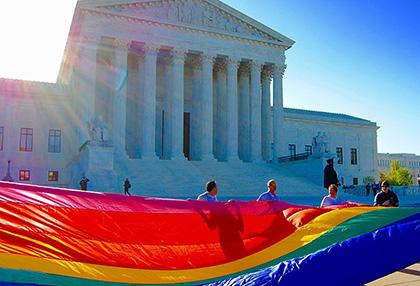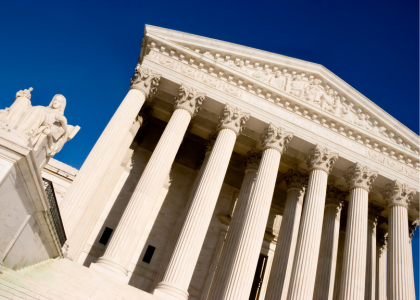
Milestones — especially in decades — usually call for celebration. The 10th anniversary of Obergefell v. Hodges, the Supreme Court case that made same-sex marriage legal nationwide, is different. There’s a sense of unease as state and federal lawmakers, as well as several judges, take steps that could bring the issue back to the Supreme Court, which could undermine or overturn existing and future same-sex marriages and weaken additional anti-discrimination protections.
A potential reversal casts shadows on same-sex marriage
Seven years after Obergefell, the Supreme Court overturned Roe v. Wade, rescinding the national right to abortion and raising fears for progressive policies.
In a concurring opinion, Justice Clarence Thomas explicitly called for the Court to revisit Obergefell. Justice Samuel Alito has echoed those sentiments, tacitly inviting legal challenges.
Despite the direction of the Supreme Court, Sears argues that Obergefell is not on the same legal footing as Roe v. Wade.
“There are significant differences between marriage equality and abortion,” he said. “Obergefell rests on both the due process clause and the equal protection clause. Roe was based squarely in privacy rights under due process. There's room for the court to say, ‘This is different.’”
Another key distinction is the legal concept of reliance, which in part acknowledges contractual agreements. Marriage, Sears says, is deeply embedded in legal, financial and familial systems.
“People start living together in anticipation that one day they will get married,” he said. “They start commingling resources. Eventually, they have a wedding. Often, people's families and friends help contribute to the wedding, and there are a lot of people relying on the fact that they are getting married. So this extension of reliance extends far beyond the couple.”
Although support has dipped slightly in recent years among subsets of the population, public opinion polls have shown enduring majority support for same-sex marriage.
“The backlash against same-sex marriage created a national discussion, and then it became a political possibility,” Sears said. “Visibility increased, and our rights increased. I’m hoping we’re on the same trajectory for transgender people.”
While Sears believes the legal arguments in favor of Obergefell are strong, he adds a note of caution.
“We still have this Supreme Court,” he said. “That doesn’t mean they’ll necessarily pay attention to the strength of these arguments.”
The future of anti-discrimination policies
Last year, at President Donald Trump’s urging, the GOP’s 2024 platform removed language condemning same-sex marriage, and only devoted a few sentences to the subject. While some saw this as progress in solidfying federal civil rights protections for LGBTQ people, Sears and others see complexity, especially as recent data has shown increased support among Republicans for restrictive bathroom bills.
“There are still those who are very committed to a faith-based morality that excludes LGBTQ people, and we’re seeing that play out with ferocious anti-transgender policies,” Sears said. “There are those who don’t believe transgender people exist, and they’re trying to enforce that.”
Williams Institute research shows an estimated 1.6 million people ages 13 and older in the U.S. identify as transgender.
The current administration has issued executive orders banning trans women from women’s sports, excluding transgender people in the military and an order stating that the U.S. recognizes only two sexes.
“There's a lot of negative policy being developed toward LGBTQ people in the country today, and it's easy to get discouraged by that,” Sears said. “Still, LGBTQ communities have survived some difficult times, and many courts are demonstrating that there is still a role for research and the rule of law.”
More recently, the Supreme Court upheld Tennessee’s law banning access to gender-affirming care for transgender youth.
The decision impacts the 112,400 transgender youth ages 13-17 who live in Tennessee and 24 other states that have similar laws banning access to gender-affirming care for transgender youth.
Those in need of care could travel to states that still offer access, creating a patchwork system not dissimilar to same-sex couples seeking marriage prior to Obergefell.
Obergefell passes its milestone in an atmosphere of uncertainty, under intermittent threat along with other rights for LGBTQ communities, but Sears and his team press on with the institute’s mission.
“The role of the Williams Institute is to continue to do research so that laws and polices reflect the realities of LGBTQ people’s daily lives, not the assertions and myths that are made up about them.”
Join us for a conversation exploring two LGBTQ-related Supreme Court cases: US v. Skrmetti and Mahmoud v. Taylor. Williams Institute Faculty Director and Constitutional Law Scholar Cary Franklin will analyze the decisions, explain their broader implications, and discuss what they mean for LGBTQ rights and the legal landscape ahead.
Annual Update Conference
The Annual Update is the Williams Institute's signature event held each spring in Los Angeles, featuring a half-day conference, the final round of our moot court competition, and a reception.
The First 100 Days: LGBTQ Rights Under the Trump Administration
This year's Annual Update will focus on early policy decisions of the new administration. The conference will take place at UCLA School of Law.
Register to attend online or in person. Lunch will be provided to those that RSVP and attend in person.
UCLA School of Law is a State Bar of California-approved MCLE provider. This session is approved for 3.25 hours of MCLE credit.
Schedule:
12:00 - 12:15pm | Lunch and Welcoming Remarks
12:15pm - 1:15pm | Global LGBTQ+ Rights: Policy Changes and Lasting Implications
1:30pm - 2:30pm | Redefining Sex: The Future of Gender Recognition in the US
2:30pm - 3:30pm | Gender-Affirming Care: Real Science, Shifting Policy, and Access to Care
3:45pm - 4:45pm | Williams Institute Moot Court Final Round
5:00pm - 6:30pm | Reception

The current U.S. Supreme Court term features major cases on gender-affirming care for minors, federal agency authority, firearms regulation, and religious liberty, along with significant questions about state power and administrative law. So far, the court has issued several decisions on employment and immigration law, with many high-profile cases still awaiting decision.
The Williams Institute hosts the premier national moot court competition dedicated exclusively to sexual orientation and gender identity law. The competition provides an opportunity for law student competitors to write an appellate brief on a current legal topic and argue the case before a panel of judges.
Past competitions examined the constitutionality of issues such as conversion therapy, religious exemptions in higher education, and access to gender-affirming care. This year's problem will address an asexual school librarian's rights under Title VII and the First Amendment.
Volunteer Opportunities
The Williams Institute is looking for student volunteers interested in serving as timekeepers for the morning rounds of the competition. All timekeepers will have the opportunity to watch two rounds of oral argument. Volunteers will be trained on the morning of the competition and do not need any prior experience. Breakfast and lunch will be provided.
The Williams Institute is currently seeking attorneys, law professors, and sitting judges to serve as volunteer judges. We will provide judges with a bench brief, summary of issues and sample questions in advance of the competition. An optional educational session prior to the competition will summarize the legal issues raised by the problem. Judges are not required to grade competitor's briefs.
MCLE Credit
All judges may receive up to 3 hours of MCLE credit for participating in the competition.
Logistics
The competition will take place at UCLA School of Law on Saturday, March 15, 2025. Breakfast, lunch, and parking will be provided for participating judges.
Morning session: 9:00 AM to noon
Afternoon session: 1:00 PM to 5:00 PM
The Fine Print
UCLA School of Law is a State Bar of California approved MCLE provider. This session is approved for 3 hours of MCLE credit.